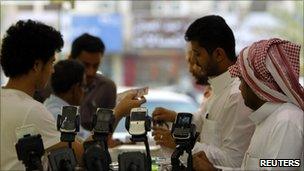Lebanon to review Blackberry phones over security fears
- Published

Governments would like access to some messages
Lebanon has joined a growing list of countries concerned about the use of Blackberry phones.
The country's Telecoms Regulatory Authority said it will assess security concerns about the device.
The move follows that of the United Arab Emirates which has threatened to ban some Blackberry services.
Saudi Arabia has called on telecom firms in the country to block the messenger function on Blackberry handsets from 6 August.
All three countries said that security concerns were behind the ban.
"This is prompted by the increase of security issues that have been found with the telecommunications networks in Lebanon," Imad Hoballah, the chair of the country's Telecommunications Regulatory Authority told French news agency AFP.
"This is related to the ability of law enforcement agencies to access the data as may be required by law," he added.
Standard dealing
Blackberry handsets automatically scramble messages and send them to computer servers in Canada.
Authorities have said they want access to these messages and the keys to decrypt them to counter terrorism and criminal activity.
"We need to make an arrangement with BlackBerry or come to an understanding with them that satisfies law enforcement concerns," said Mr Hoballah.
He said that he intended to start talks with Research In Motion (RIM) next week.
A spokesperson for RIM said that the company's products were "designed to preclude RIM, or any third party, from reading encrypted information under any circumstances since RIM does not store or have access to the encrypted data".
"RIM cannot accommodate any request for a copy of a customer's encryption key, since at no time does RIM, or any wireless network operator or any third party, ever possess a copy of the key."
Reports suggest that the firm has done deals with other countries around the world, including Russia.
However RIM denies this and says that it "cooperates with all governments with a consistent standard and the same degree of respect".
"Any claims that we provide, or have ever provided, something unique to the government of one country that we have not offered to the governments of all countries, are unfounded."
Other countries, including India, are also reportedly mulling restrictions over.
The Indian government told the BBC it was still in talks with RIM and no final decision had been made.
- Published3 August 2010
- Published4 August 2010
- Published26 July 2010